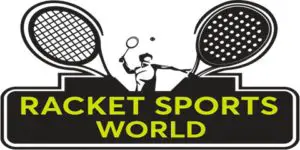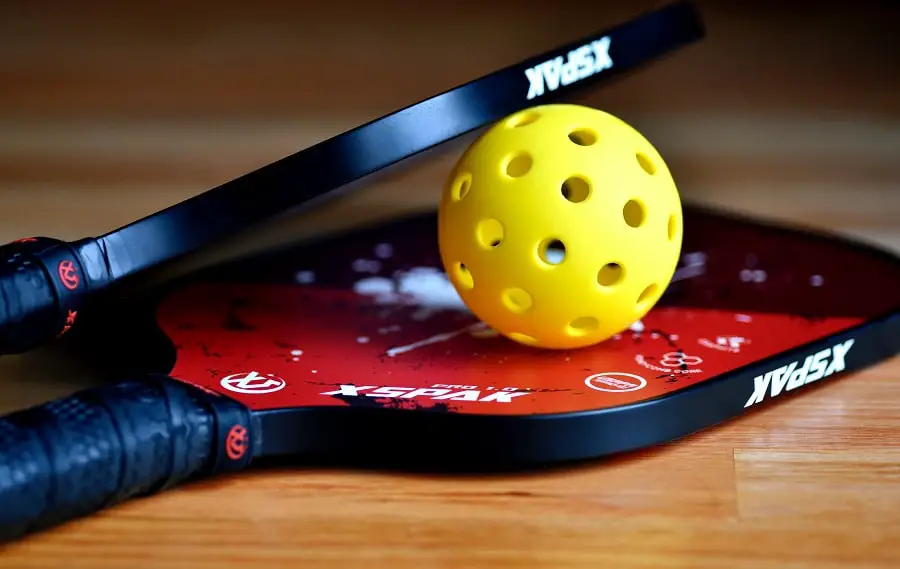There are numerous elements that have led to pickleball’s rising popularity over time. The sport’s inclusivity, accessibility, and social components make it enjoyable and exciting for people of all ages and skill levels.
Pickleball’s popularity has increased even more in recent times.
Players of all ages – including senior citizens – and ability levels are getting more and more into this paddle sport. The sport is simple and accessible for beginners to play because of its smaller court, slower tempo, and forgiving equipment.
Pickleball is said to have its own physical and mental health benefits which have made it a favorite among people at every level. Vacation home rentals have started converting whatever space they have into pickleball courts to attract travelers and charge a premium on their services.
And forget the masses, pickleball has been adopted by scores of celebrities around the world as well.
Although this sport has gained this much popularity, tennis players and fans have had their issues with it. There are various reasons why this dislike for pickleball can be attributed to.
Table of Content
So What Are The Problems that Tennis Fans Have With Pickleball?
For starters you can start by reading our piece on the differences and similarities between tennis pickleball here.
Once you have done that, below are some of the reasons why tennis fans aren’t quite chuffed about pickleball or even downright hating the sport.
Differences in Skill and Technique
Tennis and pickleball have distinct playing styles and techniques. Some tennis enthusiasts may perceive pickleball as an easier or less demanding sport, leading to a belief that it lacks the complexity and skill required in tennis.
This perception can create a sense of superiority among certain tennis fans and players.
Equipment and Court Size
Tennis is typically played on larger courts with faster-paced gameplay, while pickleball is played on smaller courts with slower gameplay.
Some tennis enthusiasts might prefer the dynamics and challenges offered by the larger tennis court, considering it more engaging and demanding compared to the smaller pickleball court.
Also Read:
Tradition and History
Tennis has a long-standing presence and rich history in the sports world. Some traditional tennis fans may view pickleball, a relatively new sport, as a passing trend or a lesser version of tennis.
This sentiment can lead to resistance or disregard for pickleball among dedicated tennis followers.
Perception of Casual Nature
Pickleball is often seen as a recreational or social sport, attracting players of various skill levels and ages. This casual perception might make some tennis fans and players perceive pickleball as less competitive or less serious compared to tennis, which can lead to a lack of interest or disapproval.
Changes in Tennis Facilities
In some cases, tennis courts have been converted or adapted to accommodate pickleball, leading to the reduction of available tennis facilities.
This change can evoke frustration among tennis players who feel their preferred sport is being overshadowed or marginalized.
Noise Levels
Pickleball is typically played with a plastic ball (made of hard plastic) and paddles, which can produce a distinct sound when the ball is struck.
This sound can be different from the traditional sound of a tennis ball hitting a racket. Some tennis fans and players who are accustomed to the specific sound of tennis might find the noise generated by pickleball disruptive or unpleasant.
Court Proximity
In some cases, pickleball courts are located in close proximity to tennis courts.
This close proximity can lead to overlapping playing areas, resulting in increased noise levels. Tennis enthusiasts who value a quieter environment during their matches may find the noise from nearby pickleball games distracting or bothersome.
Also Read:
Gameplay Interruptions
Pickleball is often played in doubles, which can involve frequent volleys and rapid movements on the court. The nature of pickleball gameplay can lead to more vocal exchanges between players, including strategy discussions and shot calls.
This heightened level of communication might be perceived as disruptive by tennis players who prefer a quieter and more focused atmosphere during matches.
Difference in Movement and Fitness
Tennis and pickleball have different movement patterns and physical requirements. Tennis typically involves more lateral movement, explosive sprints, and longer rallies, requiring a higher level of endurance and agility.
Pickleball, on the other hand, has shorter rallies and a smaller court, which can be perceived as less physically demanding by some tennis players who are accustomed to the longer, more intense matches.
Athleticism and Skill Set
Tennis players who have developed specific skills and techniques in their sport may find the transition to pickleball challenging.
Pickleball has its unique set of skills, such as dinking, volleying, and strategic placement, which may require a different type of athleticism and fine motor control.
Some tennis players may feel that the physical demands and skill set in pickleball are not as demanding or as comprehensive as those in tennis.
Preference for Intense, Fast-Paced Play
Tennis is often associated with fast-paced, high-energy gameplay that can be physically demanding. Some tennis fans and players may prefer the adrenaline and intensity that comes with the longer rallies and more vigorous movement on a larger court.
The slower pace and shorter rallies in pickleball may not provide the same level of physical challenge or excitement for those seeking a highly demanding physical experience.
Personal Fitness Goals
Tennis players may have specific fitness goals that align with the demands of their sport. They might prioritize endurance, explosive power, or specific muscle groups used in tennis.
If pickleball does not align with these fitness goals or offer a similar level of physical challenge, tennis players may view it as less appealing or less beneficial from a fitness standpoint.
Adaptation Challenges
Pickleball has its own set of rules that differ from those of tennis. Tennis players who are unfamiliar with these rules might find it challenging to adapt to the nuances of pickleball.
This adjustment process can lead to frustration or dislike for the sport due to the perceived complexity or unfamiliarity of the rules.
Perception of Simplified Rules
Some tennis fans and players might view pickleball’s rules as simplified or less sophisticated compared to tennis.
Pickleball’s rules are designed to suit the smaller court and specific gameplay dynamics, which can involve restrictions on serving techniques, court positioning, and shot selections. This perception of simplified rules might lead to a belief that pickleball lacks the strategic depth and complexity found in tennis.
Furthermore in some instances, there may be variations or inconsistencies in how the rules are applied or enforced in pickleball.
This lack of uniformity can lead to confusion and frustration among tennis players who value consistency and clear guidelines. Discrepancies in rule interpretation or application might contribute to a negative perception of pickleball’s rule differences.
Limited Professional Opportunities
There are various tournaments and possibilities for players to participate at the highest level in tennis, which has a well-established professional circuit.
However, the professional pickleball scene is still somewhat modest and underdeveloped. The few professional pickleball competitions and the modest prize money may discourage some tennis fans from making pickleball their career.
Learn how much pickleball players earn here.
Lack of Media Coverage and Sponsorship
Tennis receives extensive media coverage and attracts significant sponsorship deals, which contributes to the financial stability of professional players.
In contrast, pickleball has yet to gain the same level of media attention and sponsorship support. Tennis fans and players may perceive the lack of exposure and financial backing in pickleball as a barrier to it being a viable career option.
Established Player Base
Tennis has a large player base and a long history of competitive play, resulting in a highly competitive environment. Some tennis enthusiasts may see pickleball as a newer and less established sport, with fewer opportunities to excel and achieve recognition at a professional level.
The perception of a smaller and less competitive field in pickleball can impact the appeal for those seeking a career in the sport.
Skill Transferability
Tennis players may find it difficult to transfer their pickleball knowledge and abilities. Although the two games have certain similarities, there are significant variations in terms of gameplay methods, court size, and technique.
Tennis players can be deterred from picking up pickleball as a career because of how challenging it is to adjust to its unique needs.
Shared Facilities
In some cases, tennis facilities or clubs have incorporated pickleball courts alongside tennis courts. In some cases, the tennis courts themselves have been converted into pickleball courts.
This is because of the lack of space for standalone pickleball courts around the US and other parts of the world.
This shared usage can result in scheduling conflicts or a higher concentration of players in a limited space, leading to an increased level of noise and disturbance for tennis players.


